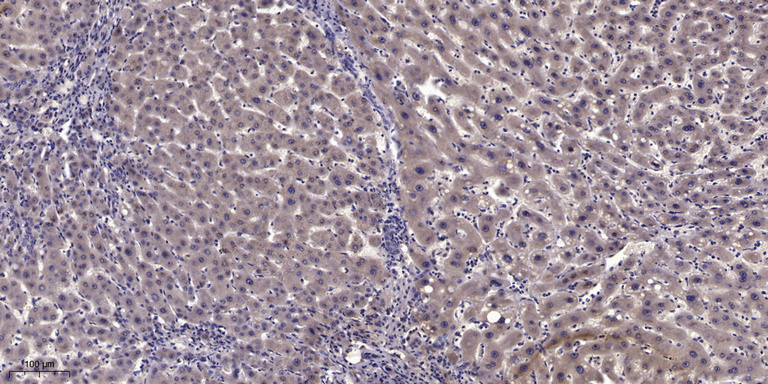MyoD (Acetyl Lys99/K102) rabbit pAb
- Catalog No.:YK0160
- Applications:WB;IHC
- Reactivity:Human;Rat;Mouse;
- Target:
- MyoD
- Fields:
- >>Spinocerebellar ataxia
- Gene Name:
- MYOD1 BHLHC1 MYF3 MYOD
- Protein Name:
- MyoD (Acetyl Lys99/K102)
- Human Gene Id:
- 4654
- Human Swiss Prot No:
- P15172
- Mouse Gene Id:
- 17927
- Mouse Swiss Prot No:
- P10085
- Rat Gene Id:
- 337868
- Rat Swiss Prot No:
- Q02346
- Immunogen:
- Synthesized peptide derived from human MyoD (Acetyl Lys99/K102)
- Specificity:
- This antibody detects endogenous levels of Human MyoD (Acetyl Lys99/K102)
- Formulation:
- Liquid in PBS containing 50% glycerol, 0.5% BSA and 0.02% sodium azide.
- Source:
- Polyclonal, Rabbit,IgG
- Dilution:
- WB 1:500-2000;IHC 1:50-300
- Purification:
- The antibody was affinity-purified from rabbit serum by affinity-chromatography using specific immunogen.
- Concentration:
- 1 mg/ml
- Storage Stability:
- -15°C to -25°C/1 year(Do not lower than -25°C)
- Other Name:
- Myoblast determination protein 1 (Class C basic helix-loop-helix protein 1;bHLHc1;Myogenic factor 3;Myf-3)
- Observed Band(KD):
- 69kD
- Background:
- This gene encodes a nuclear protein that belongs to the basic helix-loop-helix family of transcription factors and the myogenic factors subfamily. It regulates muscle cell differentiation by inducing cell cycle arrest, a prerequisite for myogenic initiation. The protein is also involved in muscle regeneration. It activates its own transcription which may stabilize commitment to myogenesis. [provided by RefSeq, Jul 2008],
- Function:
- function:Involved in muscle differentiation (myogenic factor). Induces fibroblasts to differentiate into myoblasts. Activates muscle-specific promoters. Interacts with and is inhibited by the twist protein. This interaction probably involves the basic domains of both proteins.,online information:MyoD entry,PTM:Acetylated by a complex containing EP300 and PCAF. The acetylation is essential to activate target genes. Conversely, its deacetylation by SIRT1 inhibits its function.,PTM:Ubiquitinated on the N-terminus; which is required for proteasomal degradation.,similarity:Contains 1 basic helix-loop-helix (bHLH) domain.,subunit:Efficient DNA binding requires dimerization with another bHLH protein. Seems to form active heterodimers with ITF-2. Interacts with SUV39H1.,
- Subcellular Location:
- Nucleus.
- June 19-2018
- WESTERN IMMUNOBLOTTING PROTOCOL
- June 19-2018
- IMMUNOHISTOCHEMISTRY-PARAFFIN PROTOCOL
- June 19-2018
- IMMUNOFLUORESCENCE PROTOCOL
- September 08-2020
- FLOW-CYTOMEYRT-PROTOCOL
- May 20-2022
- Cell-Based ELISA│解您多样本WB检测之困扰
- July 13-2018
- CELL-BASED-ELISA-PROTOCOL-FOR-ACETYL-PROTEIN
- July 13-2018
- CELL-BASED-ELISA-PROTOCOL-FOR-PHOSPHO-PROTEIN
- July 13-2018
- Antibody-FAQs
- Products Images

- Immunohistochemical analysis of paraffin-embedded human liver cancer. 1, Antibody was diluted at 1:200(4° overnight). 2, Tris-EDTA,pH9.0 was used for antigen retrieval. 3,Secondary antibody was diluted at 1:200(room temperature, 45min).


